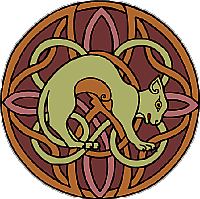We should not be surprised that Agnes Randolph, Countess of Dunbar, often called Black Agnes because of her black hair and dark complexion, was a heroine. She was after all the daughter of one of Scotland's greatest heroes, Thomas Randolph, Earl of Moray, companion and nephew of King Robert the Bruce. There were many female heroes in medieval Scotland though, and she was one of them.
There is some doubt when she was born since there is no record of it. Wikipedia says 1314, but I believe that is in error and that she was born four or five years previous to that. At any rate, she was one of four children of Sir Thomas and Isabel Stewart of Bonkyll.
Like all women of noble birth, one of her primary duties was to marry to establish an alliance or increase the family's wealth and power. The Randolphs, whose earldom covered a large swathe of Scotland north of the Firth, did not need more wealth or power. However, Sir Thomas wanted to tie the sometimes-fickle Patrick, 9th Earl of Dunbar more closely to the Scottish cause. After all, while supporting the English, the earl had given shelter to the fleeing King Edward II after the Battle of Bannockburn and aided in his escape to England. Many felt his loyalty was in doubt. Surely Randolph marrying his eldest daughter to him, a man at least three decades her elder, and thus tying him to the royal family would fix his loyalty.
However, imagine her reaction when on 20 July 1332 her father suddenly died on the way to do battle against invading English-supported pretender to the throne of Scotland. Rumor had it, whether true or false, that her father was poisoned by supporters of the English.
With a child king and only, at best, second-rate or very inexperienced commanders left to protect Scotland from the invaders, it was not long before disaster struck at the Battle of Dupplin Moor at which her older brother was killed. A shocking loss of much of her family in a very short time.
Thus began the up and down fortunes of Scotland in the Second War of Scottish Independence. The pretender was chased from Scotland and then returned with a larger army, given him in payment for making Scotland his vassal state, a much larger army. A year later after the equally disastrous Battle of Halidon Hill, Earl Patrick surrendered the city of Berwick-upon-Tweed to the English and switched sides.
No one knows what Lady Agnes thought about this. Her remaining brother was one of the defenders of Scottish independence, after all. However, both her father and King Robert had supported the English in order to live to fight another day. Perhaps she was pragmatic. But her husband attended the Scottish parliament in 1334 which shamefully ceded Berwick, Dunbar, Roxburgh and Edinburgh Castles and all of Scotland's southern counties to England. At the least, it would have been a painful period.
Earl Patrick's reward for switching sides was being forced to rebuilt at his own expense Castle Dunbar, only 20 miles from the English border, which had been slighted (torn down) at the orders of King Robert. It was then garrisoned by the English. Extended by passages onto rocks in the sea, Dunbar Castle had always been a formidable fortress. Now it was even more so. Not surprisingly at first the English garrisoned it and kept it for their but apparently confident that Earl Patrick had truly changed sides, they eventually returned to him.
Image of Dunbar Castle from a painting by Andrew Spratt
By 1335, when he fought on the Scottish side at the Battle of Boroughmuir along with his brother-in-law, the castle had been returned. He was firmly on the side of the Scots where he remained for the rest of his life. I suspect Agnes always had been.
By 1338, the fight for independence was going much better for the Scots. North of the Firth, only Cupar Castle, Stirling Castle and the strongly fortified city of Perth remained in English hands. (Most of southern Scotland still was although under pressure from Scottish guerilla tactics.) Dunbar Castle was the southernmost Scottish castle.
The English had no intention of sitting back and allowing their newly conquered nation to be reclaimed by the Scots. In December of 1337 at King Edward's command, William Montagu, Earl of Salisbury, raised a large army to take relief to the remaining northern strongholds in English hands. First they must take Dunbar Castle which they dare not leave at their back. So on 13 January 1338, he laid siege.
Perhaps Montagu thought because it was held by a woman that taking Dunbar would be an easy task. If so, he was wrong. He demanded the castle's surrender, assuring her that she would be well treated. She had an unequivocal response. The exact words may be apocryphal. The sentiment is not.
Of Scotland's King I haud my house,
I pay him meat and fee,
And I will keep my gude auld house,
while my house will keep me.
And so began the famous siege of Dunbar Castle.








